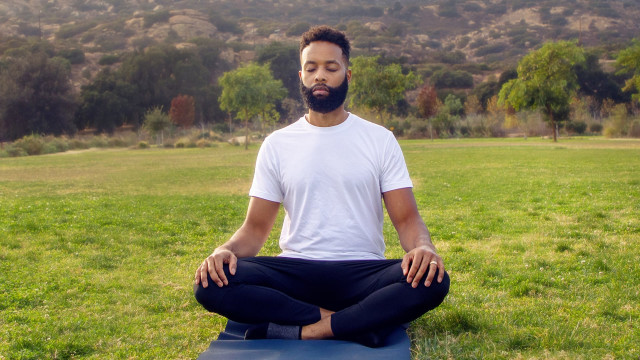The Mindfulness Effect on Stress

“Anxiety is more mental, it’s a real or imagined feeling of impending threat or doom, and usually, it's so strong it perpetuates the stress response,” says David Vago, Ph.D., a research associate professor at Vanderbilt University and research associate at Brigham & Women’s Hospital, Harvard Medical School.
When you experience anxiety, your body begins to react to the real or imagined threat in your mind by stimulating a bodily stress response. “The triggers for me are always something in my body, I start to sweat, or I feel a sort of unsettling in my gut, or little tightness in my shoulders,” Dr. Vago says.
According to Rachel Radin, assistant professor of psychiatry at the University of California San Francisco Parnassus Campus (UCSF), financial burden, health, familial or caregiver responsibility and occupation are some of the biggest causes of stress and anxiety in 2021. “[These are] some of the most common sources of ‘stress’ or anxiety I hear as a clinician-researcher, but it’s so heterogenous, and so dependent on the individual,” Radin says.
“COVID-19, being in isolation, climate change, equality, and equity are definitely some of the biggest stressors,” adds Dr. Vago.
In a 2011 study, researchers analyzed stress, health, and mortality data from a pool of 28,000 adults tracked over eight years. They found individuals who reported high levels of stress, which they perceived to significantly impact their health had a 43% increased risk of dying prematurely than those individuals who reported high levels of stress they perceived moderately impacted their health.
Perceived stress relates to how an individual may personally find a situation stressful while another may not. In fact, the most common measure of stress is the Perceived Stress Scale. “So, what you may think of as stressful may not be perceived as stressful to others, and that is the key,” Dr. Vago says.
Other studies have found a negative perception of stress can influence health outcomes. For example, in 2012, researchers found cardiac output and efficiency depended on whether the study subject perceived a stressor as a challenge or a threat. When people believed they had sufficient resources to cope with stress, they experienced a challenge response, but when they felt situational demands exceeded the resources needed to cope (e.g., feeling overwhelmed, anxious, and fearful), individuals experienced threat.
Physiologically, challenge is characterized by activation of the sympathetic-adrenal-medullary (SAM) axis, increased cardiac output, efficiency, and vasodilation (dilation of blood vessels.) These physiological changes signal an approach orientation and increase peripheral blood flow to better mobilize energy.
Threat also activates the SAM axis, but the specific cardiovascular reactivity differs from challenge because cardiac efficiency is reduced, and peripheral vasculature constricts. The threat-orientation toward a stressor signals fear, avoidance, and immobilization, and prepares the body for damage and defeat. This biopsychosocial model of challenge and threat provides clear reasons for how perception shape our response to stress.
So, Is Stress Really That Bad?
Unlike anxiety, stress can be associated with a positive experience, like before a musician performs on stage or when an athlete is preparing to run a race. Stress helps to mobilize energy, which — if used appropriately, becomes effective in healing your body and in providing you with the surge of energy needed to shut down irrelevant organ systems, while stimulating those required to sprint, dance, or flee. Stress also helps to rapidly increase and decrease your heart rate, which maintains its overall health. “The healthiest profile of heart rhythm is one that's highly variable,” Dr. Vago says.
In 2008, a group of researchers conducted a study that exposed one group of rats to stressors in their environment, while the control group experienced no stress. Both groups maintained a maternal bond with their mother, but researchers found longer dendritic branch lengths in the brains of rats who experienced stress than in the brains of those that did not, suggesting that controlled stress with opportunities for recovery (e.g., mother’s licking and grooming) also promotes healthier brain activity.
Stress becomes problematic when you don’t recover from it. This is because under stress, your body releases pro-inflammatory cytokines which help activate an inflammatory response that better manages external threats to the body. This leads to a recovery period after which anti-inflammatory markers circulate through the body. However, when you don’t recover (chronic stress), the anti-inflammatory markers don’t turn on and the pro-inflammatory cytokines continue to circulate, which can be detrimental to the health of your organs and musculoskeletal system.
For example, “People who die from COVID-19 usually have an intense and prolonged, cytokine storm, in which pro-inflammatory cytokines responding to the virus don’t shut down. And that causes the swelling in the lungs, edema, multi-organ failure, and an unfavorable prognosis for people with COVID-19,” Dr. Vago says.
Managing Stress
It’s important to recognize how your body reacts when experiencing stress and Dr. Vago cites Keisaku — a Zen practice described in a video by meditation teacher Soryu Forall, which translates to “awakening stick.” It involves a stick, a cushion, and anticipation. Participants sit in stable attention and work with fear as the teacher slowly advances with a long stick in their peripheral vision, then unexpectedly smacks them on their shoulder, “They have to hit it just right and it's painful but you anticipate the pain,” Dr. Vago recalls.
Having experienced this practice, Dr. Vago learned how to familiarize himself with his mind and body in anticipation of a stressor, and in doing so, began identifying triggers to better manage his stress. “You learn to recognize what your body's going through, what your mind is doing,” Dr. Vago says. In science, this is referred to as interoception, or internal bodily perception and exteroception, which refers to external sensory perception.
“Breath control is probably the most effective way to control our stress, and regulate the stress response when we're reactive,” Dr. Vago says. If you’re experiencing stress or anxiety, try to start each day by closing your eyes and focusing on the sensation of one breath. You can slowly build this practice by adding a breath each day. “It starts with one breath, and then two breaths, and then three breaths, and then 10,” Dr. Vago says.
This technique is also beneficial for people who struggle with insomnia because focusing on breath allows you to redirect attention away from repetitive or anxious thoughts that prevent the mind and body from resting. “The problem with sleep onset insomnia is that you're in your head. Thoughts are proliferating and you can’t stop thinking. So how do you get out of your head? The breath is the key,” Dr. Vago says.
Breathwork for Stress Management
A great way to start is through practicing the 4-7-8 breathing technique.
1. Breathe in for four seconds.
2. Hold that breath for seven seconds.
3. Release that breath as you slowly count to eight.
4. Repeat as much as you need to.
You can also try this breathwork class: Breath Meditation for Stress by Roundglass Research Lead and Neuroscientist David Vago, Ph.D.
Chronic Stress
Chronic stress results from repeated exposure to threat, constantly feeling pressured or overwhelmed by external circumstances that can sometimes be unavoidable and out of your control. This may lead to repeated or extended stress responses, along with chronic inflammation in multiple organ systems.
Chronic stress may result from racism, homelessness, or domestic abuse, among other social stressors that are beyond control. While focusing on the breath is helpful in any stressful context, Dr. Vago advises people who experience chronic social stress to find community. “Whether it's just one person as a friend, or a group of people, that social connection can be very powerful,” he says. “If you're stuck in a situation, you have to find support somewhere you can feel there's love you can tap into.”
Coping with Stress and Anxiety
Valerie (Vimalasara) Mason-John’s class on Loving Your Race, can be a great place to start for anyone trying to cope with feelings of chronic stress or anxiety related to race-based trauma. If you want to know how to breathe better, try the STOP method as a tool to cope with everyday life situations.
Regardless of your external environment, building a meditation practice through breathwork can be an effective and accessible technique to help manage anxiety, alleviate stress, and maintain mental, physical, and emotional wellbeing.
Key Takeaways:
- Stress helps to mobilize energy, which — if used appropriately, becomes effective in healing your body.
- Stress helps to rapidly increase and decrease your heart rate, which maintains its overall health.
- Breath control is an effective way to control our stress, and regulate the stress response when we're reactive.
- Building a mindfulness practice through breathwork can be an effective and accessible technique to help manage anxiety, and alleviate stress.










